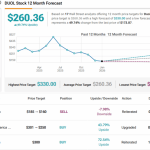The Wall Street giant’s updated requirement gives its advisors more leeway to offer crypto funds, which are poised for a big bang following recent changes at the SEC.
Morgan Stanley is expanding access to cryptocurrency investments for its wealth management clients, allowing financial advisors to offer cryptocurrency funds to any client and in any account type, including retirement accounts, starting October 15.
The move, confirmed by the company on Friday, marks a significant change from previous restrictions that limited crypto fund offerings to customers with at least $1.5 million in assets and an aggressive risk tolerance.
The change first reported by CNBC comes as the regulatory environment for digital assets in the United States continues to evolve. The Securities and Exchange Commission’s recent approval of generic listing standards for spot crypto exchange-traded funds is expected to accelerate the launch of new crypto ETFs, expanding the range of digital currencies available to investors.
“Over the next 60 to 90 days, we’ll have a dozen new crypto-focused products that will track things like Solana or XRP, or the coins that people don’t know about that are below Bitcoin and Ethereum, the ones that everyone knows about,” ETF expert David Nadig said on CNBC’s “ETF Edge.”
Learn more: New SEC rules set the stage for a wave of crypto ETFs
Morgan Stanley, which oversees $8.2 trillion in client assets, has continued to increase its crypto offering. Last month, the company announced plans to enable trading of bitcoin, ether and solana in its E-Trade subsidiary.
As part of its latest policy update, the bank will use automated monitoring to ensure customers aren’t too focused on crypto, according to people familiar with the matter. The firm’s global investment committee recently recommended a maximum initial allocation to cryptocurrencies of up to 4%, based on client objectives.
Lisa Shalett, chief investment officer for wealth management at Morgan Stanley, wrote in an Oct. 1 report that the committee “views cryptocurrency as a speculative and increasingly popular asset class that many, but not all, investors will seek to explore.”
For now, the company’s advisors are limited to offering Bitcoin funds from BlackRock and Fidelity, although Morgan Stanley is monitoring the market for potential additions. When it comes to retirement accounts, President Donald Trump’s executive order opening the door to alternatives in 401(k)s is another tailwind to the wirehouse push.
It is worth asking whether advisors would actually be willing to make the presentations that they are allowed to make. A CoinShares survey report released in February found that 62% of advisors believe recommending speculative assets like Bitcoin does not meet their legal duty to act in a client’s best interests, and more than half are concerned about the impact on their professional relationships. On the other hand, 88% of advisors said the SEC’s approval of Bitcoin and Ethereum ETFs made them more optimistic about digital assets.
Another CoinShares study in June found that 82% of wealthy investors would be more likely to work with an advisor who offers crypto-related investment advice. However, almost a third raised concerns about the credibility and transparency of advisors when it comes to digital assets.
“They are looking for advisors who can serve as strategic partners, not product promoters,” said Jean-Marie Mognetti, CEO of CoinShares.










